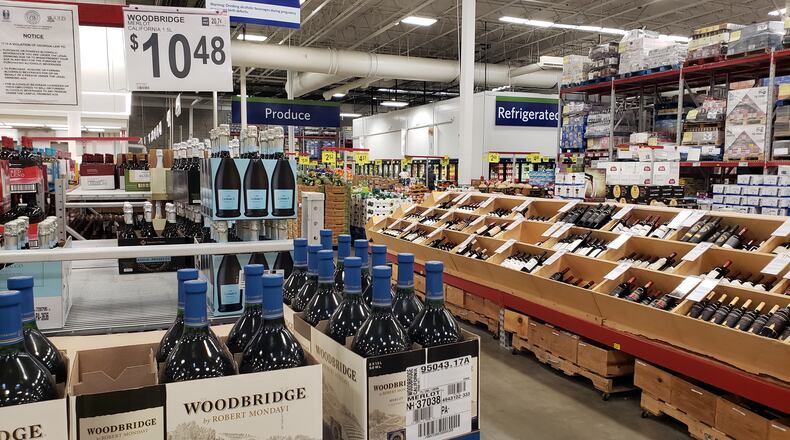Georgia students are back to hitting the books, but their parents seem to have spent the summer hitting the bottle.
State tax revenue from alcohol sales has reached new highs, according to data from the Georgia Department of Revenue, which show that as coronavirus numbers peaked in the state, booze was flying off liquor store shelves like toilet paper.
In July 2020, the latest month for which tax info is available, wholesalers paid the state $20.2 million in taxes. That’s up from $16.3 million in July 2019, an almost 25% increase, and the highest number since February 2012, said Kristen Bartholomew, public information officer for the revenue department.
Tax rates have not changed, so that means people are socially distancing with drinks firmly in hand.
What’s really changed is where people are doing most of their drinking. We used to hit our favorite bars and restaurants, now we sip spiked sarsaparilla on the veranda.
Bar sales have tanked, said Atlanta resident Doug Hertz, president and CEO of United Distributors, the largest alcoholic beverage wholesaler in Georgia and Alabama. But overall sales are up because liquor stores and other drink-at-home suppliers picked up the shot glass and ran with it.
Wholesalers provide alcohol to every business that can legally sell it. There are two categories of vendors: on-premise and off-premise. Hertz described the former as “bars, restaurants, hotels, venues and the airport.” Off-premise sales come from liquor stores, supermarkets and other places where you can’t immediately drink what you just bought.
On-premise sales, which comprised about 22% of United’s revenue in Atlanta “disappeared overnight” as the coronavirus took hold in March, Hertz said, but off-premise vendors sold more.
“Retail sales were up over 30%, more than picking up the slack,” Hertz said, in describing the uptick.
Every month since the pandemic began, wholesalers have paid the state more in tax revenue than the same month last year. Taxes paid in January and February 2019 were almost identical to 2020. In March, the coronavirus hit town. In early April, Gov. Brian Kemp issued a shelter in place order and panic buying began. It can still be a challenge to find paper towels, but alcohol is abundant, even though some distilleries used production time to make hand sanitizer.
March 2020 tax revenue ticked up 3.5% as early adopters hoarded Jack Daniels other favorite libations. In April, as folks realized they might be staring at the same walls for months, alcohol tax collections were up 13%. Overall, during the five months of the pandemic for which there is tax data, revenue is 11% higher than the same months in the comparatively disease-free 2019.
What are people drinking? Because beer, wine and liquor are taxed at different rates, it’s not easy to tell, but July 2020 taxes show beer rings up roughly 45% of the state’s take. Liquor accounts for 35%, wine 20%. These percentages are almost identical to the previous year, but the the dollar amounts have increased to about $9 million in state tax income for malted beverages, $7 million for liquor and $4 million for wine.
Hertz said there are definite winners and losers in the drink at home game. The back porch beer pong champ is not beer, it’s hard seltzers such as White Claw.
“We can’t keep it on the shelves,” he said, recounting a tale of how 11,000 cases of hard seltzer arrived at United’s Smyrna facility recently and evaporated within 24 hours.
Home margarita machines must be firing on all cylinders as tequila has show the most sales growth in the liquor category. Bourbon and whiskey sales are also up. High-end brands are doing well, Hertz said.
The relatively low-brow Tito’s vodka is leading the home cocktail parade, but overall vodka and gin sales are flat.
Lighter and fruitier wines are the current varietal of choice, due to summer temperatures, Hertz said.
People going into stores “don’t want to look around, they want to get in and out,” Hertz said, and this has helped traditional brands.
“They dive into a store and go with what they know in larger sizes,” Hertz said, explaining a sudden consumer fondness for bigger bottles and cases of beer.
Large domestic brewers like Miller Brewing Company and Budweiser are partying like it’s 1999, Hertz said, and in 2020 they will likely reverse the trend of losing market share to craft brewers.
Hometown brewers might be suffering most in the industry, Hertz said, because they depend on tasting rooms, which are closed or have fewer customers, and people are less willing to try seasonal and new products during the pandemic.
Brian Purcell, founder and CEO of Decatur brewery Three Taverns, said they’ve lost double-digit growth, but adjusted to the shifting marketplace to stay afloat.
With bars among the last businesses to reopen, draft beer sales have lost fizz, down 68% compared to 2019, but package sales are up, Purcell said. Overall, they’re only 2% down in revenue and haven’t had to furlough any employees.
“It’s a lost year for craft brewing,” said Purcell, who noted their mix of business has gone from 68% package sales and 32% draft to 88% package and 12% draft.
Cans are more profitable than kegs, he said, and they’ve been able to ramp up sales of 6-packs by converting their tasting room into a retail store and selling new releases via the CraftCellr app. A recent batch of brew, 50 cases, sold out in 2 minutes, he said.
Purcell agreed with Hertz, that familiar brands, such as Three Tavern’s Night on Ponce IPA, are what people are turning to during tough times.
“We feel very fortunate we launched seven years ago, which gave us the time to build staple brands that have carried us through the pandemic,” he said.
About the Author
Keep Reading
The Latest
Featured







